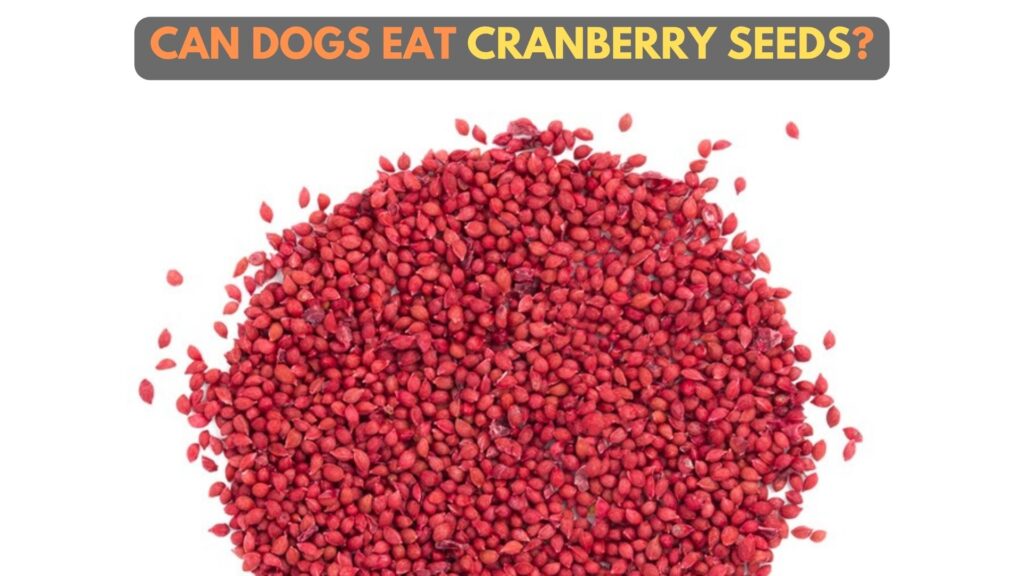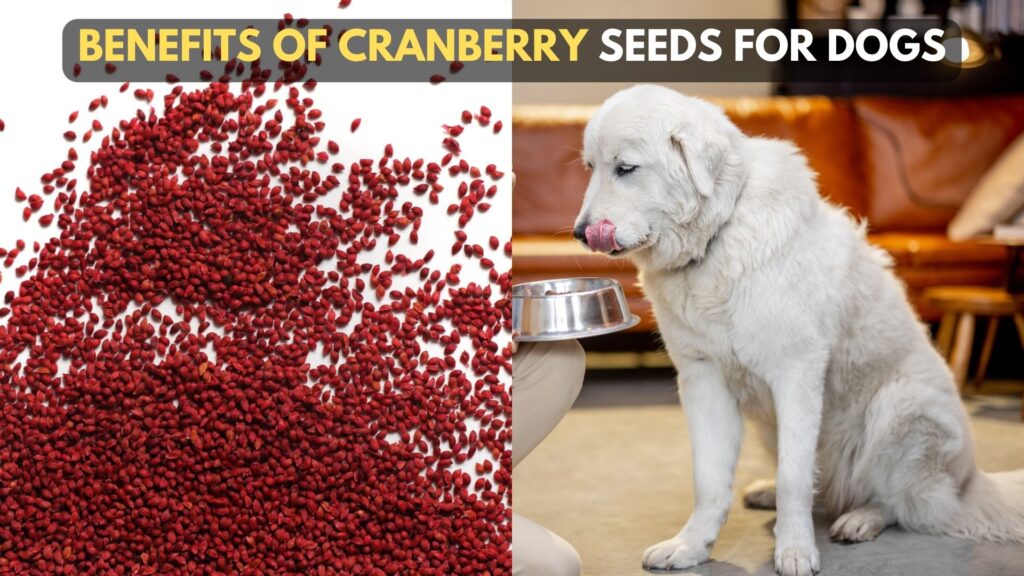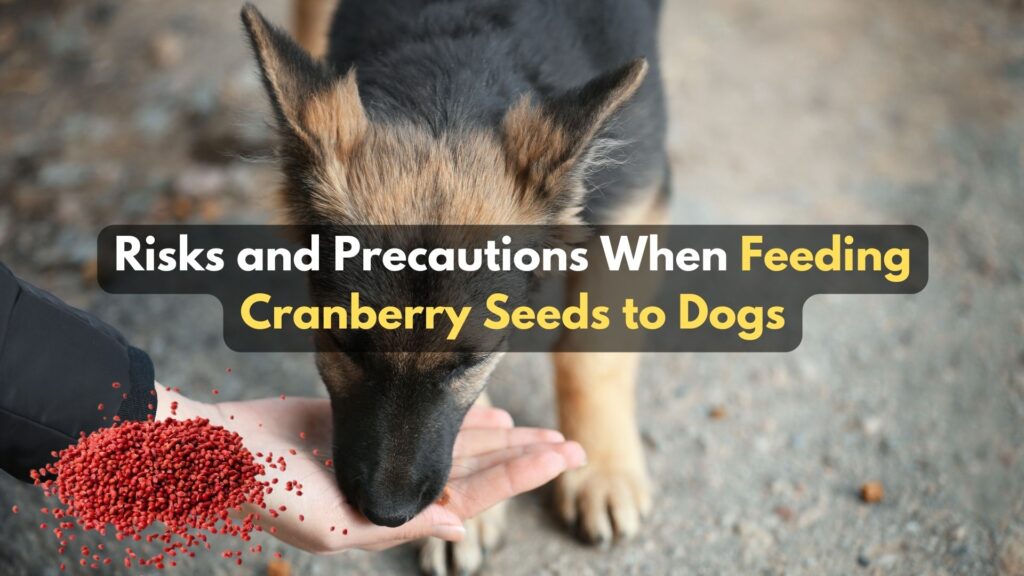Cranberries are a quintessential part of human diets, especially known for their vibrant color, distinct tart flavor, and health benefits. This small, red fruit has made its way into a variety of dishes and products, from juices and sauces to dried snacks and supplements.
With such a prominent place in human nutrition, it’s natural for pet owners to wonder about the potential benefits or risks associated with feeding cranberries, particularly cranberry seeds, to their dogs.
As more individuals strive to provide the best care for their furry companions, understanding which foods are safe for dogs to consume becomes increasingly important.
This includes delving into whether the tiny seeds found in cranberries can be included in a dog’s diet without causing harm, ensuring that pet owners can make informed decisions about their dog’s health and well-being.
🍒The Nutritional Value of Cranberries for Dogs
Cranberries are not just a tasty treat; they are also packed with nutrients that can offer health benefits, potentially for dogs as well as humans.

This section explores the nutritional value of cranberries and how these nutrients could positively impact canine health.
- Antioxidants: Cranberries are rich in antioxidants, such as Vitamin C and E, and various phytochemicals. These compounds can help neutralize free radicals, potentially reducing inflammation and supporting overall health in dogs.
- Fiber: The dietary fiber found in cranberries can aid in digestion, promoting healthy bowel movements and preventing constipation in dogs. While the flesh of the fruit contains most of the fiber, small amounts can also be found in the seeds.
- Vitamin C: Though dogs can produce Vitamin C in their liver, additional sources from foods like cranberries can provide immune system support and enhance their overall health.
- Manganese: This essential mineral, present in cranberries, plays a crucial role in bone health and energy metabolism, contributing to a dog’s growth and overall vitality.
- Low Calorie: Cranberries are low in calories, making them a potentially healthy snack option for dogs, especially those managing weight.
Understanding the specific nutrients found in cranberries and their effects can help dog owners consider how best to include this fruit in their pet’s diet, ensuring they reap any potential benefits without risks.
However, it’s crucial to differentiate between the fruit’s flesh and seeds, as the latter may pose different considerations when it comes to canine consumption.
🐶Can Dogs Eat Cranberry Seeds? Unpacking the Facts
When it comes to feeding dogs cranberry seeds, the primary concern for pet owners is safety. Cranberry seeds are small and may seem inconspicuous, but it’s essential to understand their impact on canine health fully.

Unlike the fruit’s flesh, which is widely recognized for its nutritional benefits, seeds can sometimes be a contentious topic due to concerns about digestibility and potential toxins.
Digestibility:
Cranberry seeds are relatively small and, in moderate quantities, are unlikely to pose a significant risk of intestinal blockage or choking for dogs. However, because they are seeds, there’s a question of how well they can be digested by a dog’s gastrointestinal tract.
While there’s no direct evidence to suggest that cranberry seeds are harmful, their nutritional benefits might not be as readily available to dogs due to potential digestion issues.
Toxicity:
There is no known toxicity in cranberry seeds for dogs. Unlike some seeds and pits from other fruits, such as cherries or apples, which can contain harmful substances, cranberry seeds do not contain cyanide or other toxic compounds.
Comparison with Flesh and Juice:
The flesh and juice of cranberries are known to be safe for dogs in small quantities. These parts of the fruit provide the most nutritional benefits, such as vitamins, minerals, and antioxidants, without the concerns that come with seeds.
However, cranberry products often contain added sugars or other ingredients that can be harmful to dogs, so it’s crucial to choose plain, unsweetened cranberries when offering them to your pet.
Potential Health Benefits of Cranberries for Dogs
Cranberries can offer several health benefits for dogs, primarily due to their high antioxidant content, which can support various aspects of canine health.

Urinary Tract Health:
One of the most well-known benefits of cranberries is their ability to support urinary tract health. The compounds in cranberries can help prevent the adhesion of bacteria to the walls of the urinary tract, potentially reducing the risk of urinary tract infections (UTIs).
While more research is needed to fully understand this effect in dogs, it’s a promising area of study.
Dental Health:
The same properties that help cranberries support urinary tract health can also benefit dental health by preventing bacteria from adhering to teeth and gums. This may help reduce the risk of dental issues such as plaque buildup and gum disease.
Antioxidant Properties:
The antioxidants found in cranberries, including Vitamin C and E, can help protect dogs’ cells from damage by free radicals. This can contribute to overall health and wellness, supporting everything from immune function to aging.
While these potential benefits are compelling, it’s important to note that scientific studies specifically addressing the effects of cranberries or cranberry seeds on dogs are limited.
Veterinary advice often supports the cautious inclusion of cranberries in a dog’s diet, focusing on the flesh and juice rather than the seeds.
As with any dietary change, it’s recommended to consult with a veterinarian before introducing cranberries or cranberry seeds to ensure it’s appropriate for your dog’s specific health needs and dietary restrictions.
Risks and Precautions When Feeding Cranberry Seeds to Dogs
While cranberry seeds do not inherently contain toxic substances, there are potential risks and necessary precautions to consider when introducing them into a dog’s diet.

Potential Risks
- Gastrointestinal Upset: Like any new food item, cranberry seeds can cause gastrointestinal upset in some dogs. Symptoms may include vomiting, diarrhea, or a decreased appetite. These symptoms are generally a sign that the dog’s system is not responding well to the new addition.
- Choking Hazard: Although the risk is low due to their small size, there is a potential choking hazard, especially for small dogs or puppies. Ensuring that seeds are given in moderation and observing your dog while they eat can help mitigate this risk.
- Digestibility Concerns: There’s also the question of whether dogs can effectively digest cranberry seeds to gain any nutritional benefit. Indigestible items can sometimes pass through a dog’s system without causing harm but also without providing nutritional value.
Precautions and Recommendations
- Consultation with a Veterinarian: Always consult with a veterinarian before introducing new foods into your dog’s diet, especially if your dog has existing health issues or dietary restrictions.
- Start Small: If you decide to introduce cranberry seeds, start with a very small amount to see how your dog reacts.
- Monitor for Adverse Reactions: Keep an eye on your dog for any signs of gastrointestinal distress or allergic reactions after introducing cranberry seeds.
Recommended Portion Sizes and Frequency
Due to the potential risks and the unknowns regarding their nutritional benefit, cranberry seeds should be considered more of a sporadic treat than a regular part of a dog’s diet. A very small number of seeds (a pinch or so) is more than enough to test tolerance.
It’s advisable to limit the offering of cranberry seeds to an occasional treat rather than a daily supplement.
How to Safely Introduce Cranberry Seeds into Your Dog’s Diet

Introducing cranberry seeds safely into your dog’s diet requires careful monitoring and gradual introduction.
- Consult Your Veterinarian: Before making any dietary changes, get approval from your vet, especially if your dog has specific health concerns.
- Start With a Tiny Amount: Introduce a very small quantity of cranberry seeds to your dog’s diet—no more than a pinch.
- Observe Your Dog: After introducing cranberry seeds, closely monitor your dog for any signs of discomfort, allergic reactions, or gastrointestinal upset.
- Evaluate the Need: If your dog tolerates cranberry seeds well and enjoys them, consider whether they’re necessary for your dog’s diet. Given the limited nutritional value they offer, it may be better to focus on other, more beneficial foods.
Alternative Ways to Include Cranberries in a Dog’s Diet
Mixing with Regular Food:
Incorporate a small amount of plain, unsweetened cranberry flesh into your dog’s regular food. This can provide the nutritional benefits of cranberries without the potential risks associated with the seeds.
Cranberry Supplements:
For specific health concerns, such as urinary tract health, consider vet-approved cranberry supplements designed for dogs. These are formulated to provide the benefits of cranberries in a safe, controlled dose.
By following these guidelines, you can ensure that any new addition to your dog’s diet, including cranberry seeds, is introduced in a safe and thoughtful manner.
FAQs
Can dogs have an allergic reaction to cranberry seeds?
Yes, dogs can have allergic reactions to any new food, including cranberry seeds. While it’s not common, owners should watch for signs of an allergic reaction, such as itching, hives, swelling, or gastrointestinal distress, and discontinue use if any adverse effects are observed.
Are there any dog breeds that should avoid cranberry seeds?
No specific dog breeds need to avoid cranberry seeds due to their breed alone. However, individual dogs with certain health conditions or dietary sensitivities may need to avoid them.
Consultation with a veterinarian can help determine if cranberry seeds are safe for your specific dog.
How often can I feed my dog cranberry seeds?
Cranberry seeds should be considered an occasional treat rather than a regular dietary supplement. Given the potential risks and the lack of substantial nutritional benefits, feeding them sparingly and infrequently is advisable.
Can puppies eat cranberry seeds?
Puppies have more sensitive digestive systems, so introducing any new food, including cranberry seeds, should be done with extra caution.
It’s generally recommended to avoid giving puppies cranberry seeds due to the potential risks of gastrointestinal upset and the choking hazard.
Are cranberry seeds better than cranberry supplements for dogs?
Cranberry supplements for dogs are typically formulated to provide the specific benefits of cranberries, such as supporting urinary tract health, without the risks associated with feeding the raw seeds.
These supplements often come in doses that are appropriate for a dog’s size and nutritional needs, making them a safer and more effective option than cranberry seeds.
Conclusion
In conclusion, while cranberry seeds can be safe for dogs in moderation, their potential benefits do not significantly outweigh the risks associated with feeding them. It’s crucial for pet owners to approach the inclusion of any new food in their dog’s diet with caution, and cranberry seeds are no exception.
Consulting with a veterinarian before introducing cranberry seeds—or any new food—is essential to ensure it aligns with your dog’s specific health needs and dietary requirements.
Responsible pet ownership involves not only caring for your dog’s immediate needs but also investing in their long-term health through ongoing education about pet nutrition.
By prioritizing safety and informed decision-making, owners can help ensure their furry friends enjoy a healthy, happy life.


